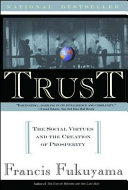

Trust forms the foundation of all successful relationships, whether personal or professional. In a world where skepticism is rampant, fostering trust requires authenticity, transparency, and consistency. This idea delves into how trust is built over time through shared experiences and mutual respect. It emphasizes that trust is not merely a feeling but a critical component that influences decision-making, collaboration, and overall satisfaction in relationships. The book illustrates how organizations that prioritize trust tend to outperform their competitors, as trust fosters loyalty and encourages open communication.
Continue readingThe book posits that trust should be viewed as a strategic asset for individuals and organizations. Just like financial capital, trust can be invested in and leveraged for greater returns. This idea explores how building trust can lead to enhanced reputation, customer loyalty, and employee engagement. By viewing trust as a currency, leaders can make informed decisions about where to allocate resources to cultivate trust within their teams and with their customers, ultimately driving long-term success and sustainability.
Continue readingVulnerability is often seen as a weakness, yet the book argues it is a powerful tool for building trust. By being open about one's limitations and uncertainties, individuals can create an environment where others feel safe to express themselves. This idea highlights the paradox of vulnerability—while it may expose one to risk, it also fosters deeper connections and trust. The book provides examples of leaders who have embraced vulnerability, demonstrating how it can lead to stronger teams and more innovative solutions.
Continue readingIn an era dominated by technology, the dynamics of trust have evolved significantly. The book examines how digital interactions can both enhance and undermine trust. It discusses the challenges posed by misinformation, data breaches, and the impersonal nature of online communication. However, it also highlights the opportunities technology provides for building trust through transparency, accountability, and community engagement. The idea emphasizes the need for individuals and organizations to adapt their trust-building strategies to the digital landscape.
Continue readingEffective leadership is inextricably linked to trust. The book outlines the characteristics of trust-based leadership, including integrity, empathy, and the ability to inspire. It argues that leaders who prioritize trust create environments where employees feel valued and motivated to perform at their best. This idea also discusses the consequences of a lack of trust in leadership, such as disengagement and high turnover rates. The book provides actionable insights for leaders looking to cultivate trust within their organizations.
Continue readingTrust is not a one-size-fits-all concept; it varies significantly across cultures. The book explores how cultural norms and values shape perceptions of trust and influence interpersonal dynamics. It emphasizes the importance of cultural awareness in global interactions, suggesting that understanding different trust frameworks can lead to more effective communication and collaboration. This idea encourages readers to consider how their own cultural backgrounds inform their trust-building strategies.
Continue readingAs society continues to evolve, so too will the concept of trust. The book speculates on future trends that may impact trust, such as advancements in artificial intelligence, changing workforce dynamics, and shifting societal values. It encourages readers to think critically about how they can proactively shape the future of trust in their personal and professional lives. This idea serves as a call to action for individuals and organizations to remain agile and adaptable in a rapidly changing world.
Continue readingThe reading time for Trust depends on the reader's pace. However, this concise book summary covers the 7 key ideas from Trust, allowing you to quickly understand the main concepts, insights, and practical applications in around 25 min.
Trust is definitely worth reading. The book covers essential topics including The Importance of Trust in Relationships, Trust as a Strategic Asset, The Role of Vulnerability in Building Trust, providing practical insights and actionable advice. Whether you read the full book or our concise summary, Trust delivers valuable knowledge that can help you improve your understanding and apply these concepts in your personal or professional life.
Trust was written by Francis Fukuyama.
If you enjoyed Trust by Francis Fukuyama and want to explore similar topics or deepen your understanding, we highly recommend these related book summaries:
These books cover related themes, complementary concepts, and will help you build upon the knowledge gained from Trust. Each of these summaries provides concise insights that can further enhance your understanding and practical application of the ideas presented in Trust.